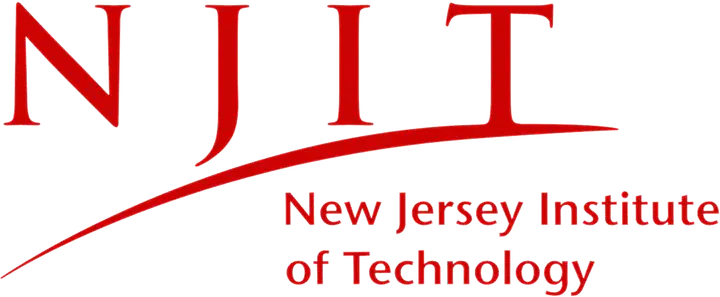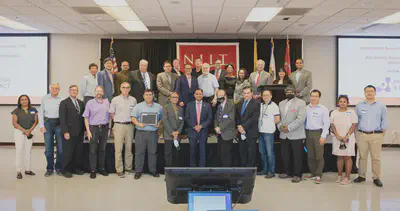NJIT Launches a Campus Chapter of the National Academy of Inventors

Written by: Tracey Regan

In conjunction with the 2021 Summer Research Symposium, NJIT launched a campus chapter of the National Academy of Inventors (NAI), an organization founded in 2010 to recognize and promote academic technology and innovation and to encourage its translation into devices and services that benefit society.
NJIT inducted 32 faculty members at the ceremony, as well as nine honorary members, including President Joel Bloom and Provost Fadi Deek. Chapter members must hold patents issued from the U.S. Patent and Trademark Office (USPTO).
Atam Dhawan, senior vice provost for research, called the chapter’s inauguration “a giant step forward in promoting research and innovation towards entrepreneurship and technology translation.”
The chapter will promote translational research and its commercialization through campus R&D programs, grants, clubs and acceleration programs; offer invention-focused networking and educational activities, such as workshops and seminars on innovation and intellectual property development; and provide mentoring and advising services to faculty and student inventors on further development of IP assets.
The university will recognize inventors and their achievements through events such as annual NAI-NJIT chapter awards and member recognition workshops, Innovation Day and the Summer Research Symposium.
“NAI seeks to raise the importance of invention – without which we would not have modern communication networks, cures for diseases or new sources of carbon-free energy – and to help build networks and resources that will further this work,” said Dhawan, president of the NJIT-NAI chapter. “This is a strategic priority of NJIT as well, with its emphasis on applied research and technology translation.”
In the keynote speech at the event, Elizabeth Daugherty, the outreach director for the USPTO’s eastern region and a board member of the NAI, spoke of the power of inventions to create the future.
“Through these doors comes science and technology that we cannot contemplate today,” Daugherty said of the USPTO. “And it will come from inventors and innovators including you.”
She added, however, “We need a higher percentage of our population to participate … we must also identify proper role models for young people so they will look to futures in engineering and tech, especially when it comes to women. This is where an NAI chapter can bring so much value to a university. Women constitute over half the population of the U.S., but their participation in STEM jobs and the IP system lacks far behind their male counterparts.”
Shortly after its founding, the NAI established a Fellows program to highlight academic inventors who have demonstrated “a prolific spirit of innovation in creating or facilitating outstanding inventions that have made a tangible impact on quality of life, economic development and the welfare of society.” New fellows are inducted each year at a ceremony at USPTO headquarters in Alexandria, Virginia, where they share experiences and make new connections.
Since the first year in 2014, nine NJIT inventors have been named fellows:
2020: Rajesh Davé, a chemical and materials engineer whose groundbreaking methods for re-engineering tiny particles have fueled advances in such diverse areas as weapons safety and drug delivery systems; MengChu Zhou, an electrical and computer engineer and pioneer in automation science and engineering who optimizes systems, from manufacturing, to data centers, to transportation, to glean efficiencies and improve outcomes
2019: Nirwan Ansari ’82, an electrical and computer engineer whose research on telecoms networks formed part of the backbone for broadband access and later FIOS networks
2018: Craig Gotsman, a computer scientist who invented a number of cutting-edge software technologies for manipulating 3D geometric data, enabling their use in a variety of applications
2017: Yun-Qing Shi, an electric and computer engineer best known for devising methods to hide and retrieve data embedded in digitized images and speech
2016: Kamalesh Sirkar, a chemical engineer known for his innovations in industrial membrane technology used to separate and purify air, water and waste streams and to improve the quality of manufactured products such as pharmaceuticals, solvents and nanoparticles
2015: Atam Dhawan, an electrical and computer engineer whose patent on low-angle transillumination technology for the examination of skin lesions led to the formation of two companies with products that are now being used to treat spider vein diseases and to non-invasively diagnose skin cancers; Som Mitra, a chemist and environmental scientist with patents in areas ranging from trace measurements to diverse nanotechnology applications ranging from flexible batteries, to solar cells, to seawater desalination
2014: Gordon Thomas, a physicist and diverse researcher whose inventions range from medical devices, to weapons sensors, to optical communications fiber
Senior Members:
2020: Eon Soo Lee, a mechanical and industrial engineer who develops microfluidic biosensors to detect diseases
2019: Sagnik Basuray, a chemical and materials engineer who develops novel sensors, diagnostic devices and drug delivery systems
2019: Bipin Rajendran, an electrical and computer engineer who develops computing systems that aim to match the efficiency seen in nature by studying the organizational principles of the brain
https://news.njit.edu/njit-launches-campus-chapter-national-academy-inventors